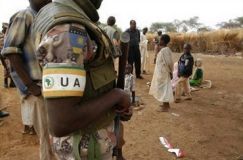US shows scepticism over Sudan acceptance of Darfur force
June 12, 2007 (NAIROBI) — Sudan has accepted a revised plan for a joint African Union and U.N. peacekeeping force, a senior African Union official said Tuesday in Ethiopia – but U.N. diplomats said the approval came with difficult conditions, and there was widespread skepticism of any breakthrough.
 Sudanese, U.N. and A.U. official met in Addis Ababa for two days to discuss a three-stage U.N. plan that calls for bolstering the poorly equipped and underfunded force of 7,000 A.U. peacekeepers in Darfur in Sudan’s west with a joint force of 23,000.
Sudanese, U.N. and A.U. official met in Addis Ababa for two days to discuss a three-stage U.N. plan that calls for bolstering the poorly equipped and underfunded force of 7,000 A.U. peacekeepers in Darfur in Sudan’s west with a joint force of 23,000.
On Tuesday, a top AU official announced that Sudan’s President Omar al-Bashir had accepted the plan for a “hybrid” A.U.-U.N. force of between 17,000 and 19,000 troops for Darfur after receiving “clarifications” of the plan.
However, there was widespread skepticism of Sudan’s commitment, given Khartoum’s repeated backtracking on the proposal and the lack of detail about how officials managed to satisfy al-Bashir, who has demanded in the past that the entire force come from Africa and be commanded by the A.U., not the U.N.
U.S. State Department spokesman Sean McCormack, expressing Washington’s skepticism, noted that African countries lack the assets to provide the full number of troops without support from outside the continent.
“President Bashir has made promises before about accepting an A.U.-U.N. hybrid force, but there’s always the fine print,” he said Tuesday. “So, to say that the force would be limited to only African troops is, in effect, to say that you are not agreeing to the full 17,000 to 19,000 troops.”
Al-Bashir also agreed in November to the U.N. proposal – but has stalled acceptance of the first two phases and has since backtracked on his approval.
On Monday, he said Sudanese officials were studying a revised plan, and sent the U.N. secretary-general a letter “unequivocally” backing the plan, according to a U.N. spokeswoman. However, the letter – obtained Monday by The Associated Press – didn’t provide details or reflect committed backing for the plan.
French Foreign Minister Bernard Kouchner said al-Bashir told him Monday that he fully agreed to the proposed “hybrid” force – but was adamant that all of the troops must come from Africa, a demand that experts say would be close to impossible to fulfill.
On Tuesday, Said Djinnit, the African Union’s top peace and security official, read a joint A.U.-U.N.-Sudanese statement saying: “In view of the explanation and clarification provided by the A.U. and the U.N. as contained in the presentation, the government of Sudan accepted the joint proposals on the hybrid operation.”
He said officials also agree on the need for “an immediate comprehensive cease-fire accompanied by an inclusive political process,” and called on countries to step up and quickly contribute troops and money toward the operation.
However, it wasn’t immediately clear what changes were made to satisfy the Sudanese, and a senior Sudanese official said Khartoum hasn’t changed its position on the hybrid force.
Sudan has always demanded that the force be under African Union command and its members be Africans only, said Mutrif Siddig, a senior official from Sudan’s Foreign Affairs Ministry who attended the meeting in the Ethiopian capital.
He also said Sudan supports a joint force “but we rejected the transfer of the African mission to the United Nations,” referring to the overall command of the force.
He added: “If African countries do not have enough troops or are not willing to contribute, in consultation with the Sudanese government, the United Nations and African Union, we are ready to recruit other countries, according to our agreement,” Siddig said.
Last week, the U.N. and African Union chief executives said they resolved the dispute over command of the force. A senior U.N. official said technical agreements – which haven’t been made public – give the U.N. overall operational control while delegating day-to-day operations and decisions on troop deployments to an A.U. commander.
However, it was unclear whether the compromise would satisfy potential contributors to the peacekeeping force who want the U.N. to command the joint force – or A.U. and Sudanese demands for a major A.U. role.
The decisions made Tuesday still must be approved by the U.N. Security Council and the African Union’s Peace and Security Council, Djinnit said.
In New York, Security Council diplomats said they had been informed that Sudan’s acceptance came with conditions, including requiring all troops in the hybrid force to be Africans. That could make putting together a robust force difficult, if not impossible, the diplomats said, speaking on condition of anonymity because there has been no public announcement.
“I’d like to see what the agreement is,” said U.S. Ambassador Zalmay Khalilzad. “If the agreement is unconditional support of the package, then we obviously would welcome that because the letter we got yesterday was a little bit more of the same kind of pattern we have seen before of vagueness and lack of clarity.”
“But if this is a clear, unconditional acceptance of the A.U.-U.N. concept, it’s welcome,” he said. “Now we move to the implementation, which is another issue that has been there in the past where there has been acceptance and then implementation has been a problem.”
Djinnit said discussions on the force’s size would continue, as well on the challenge of providing air transport to move the troops around Darfur.
More than 200,000 people have died in Darfur and 2.5 million chased from their homes since 2003, when local rebels took up arms against the Sudanese government, accusing it of decades of neglect. Sudanese leaders are accused of unleashing the pro-government Arab militia, the janjaweed, to fight them – a charge they deny.
(AP)
